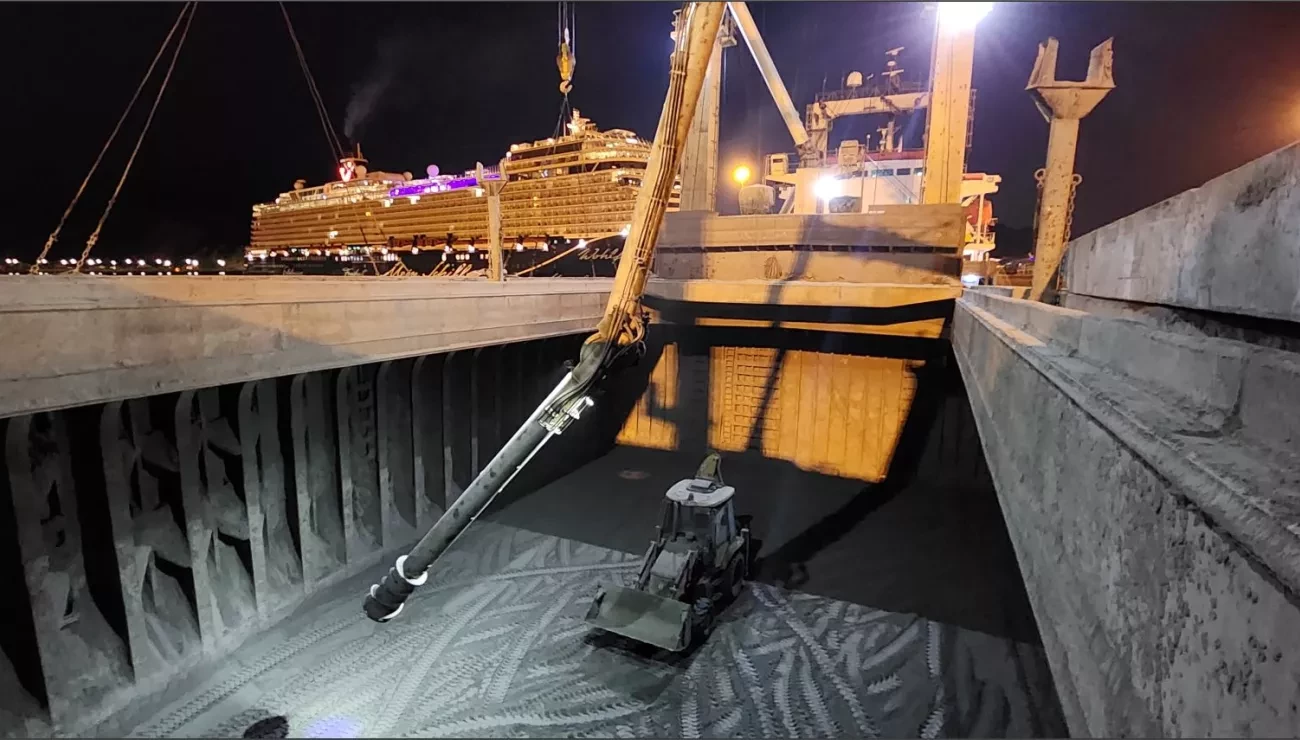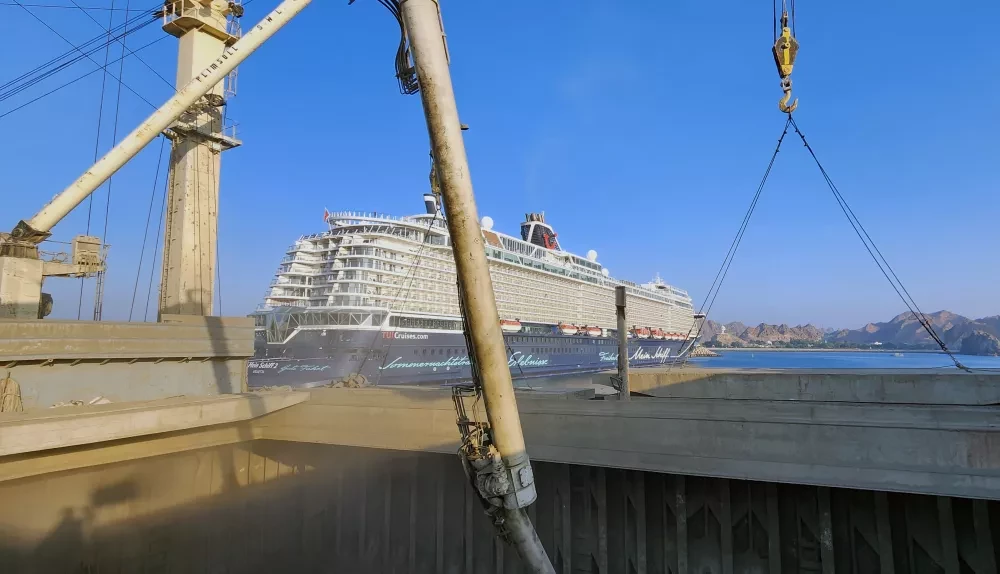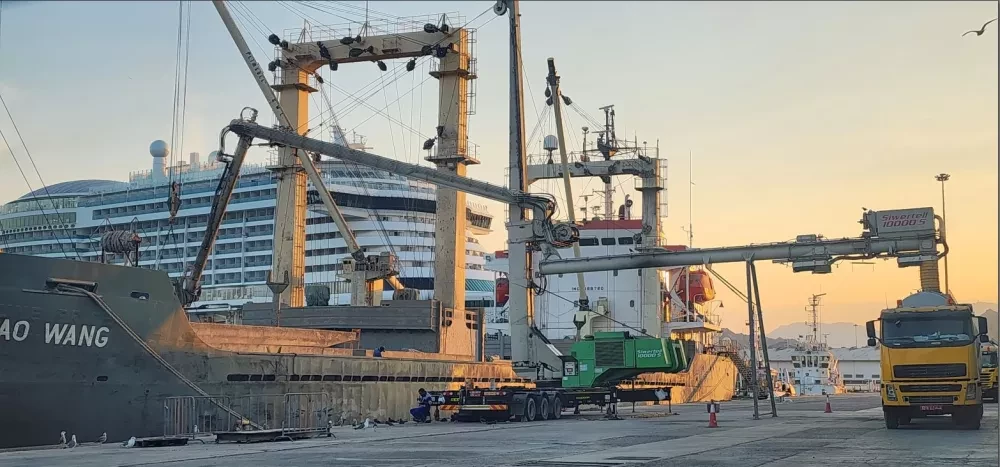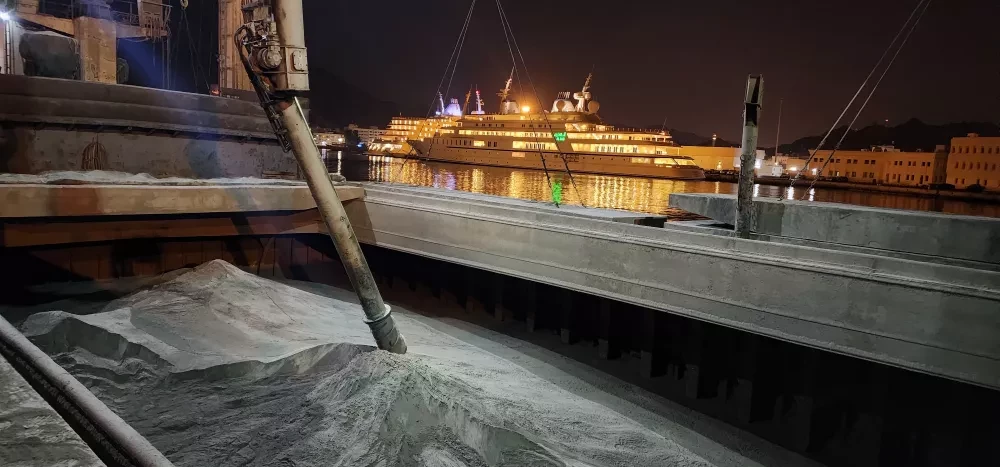
Recommissioned road-mobile unloaders offer agile, efficient, environment-friendly cement handling for Oman operator
3 Jun 2024A pair of recently acquired and recommissioned Siwertell road-mobile ship unloaders, one 5 000 S and one 10 000 S, have been brought back to peak performance for Pioneer Cement LLC, headquartered in Muscat, Oman. The operator is among the leading suppliers of construction materials in the region, with other facilities located in Oman, the United Arab Emirates (UAE), Kuwait, Turkey, and Tajikistan.
Pioneer Cement runs a dynamic cement supply business with road-mobile ship unloading capabilities highly prized to ensure that it has asset agility and can respond to changing market demands. To meet these, its renovated ship unloaders now move between the ports of Suwaiq, Sultan Qaboos, and Sur in Oman, directly discharging cement to bulk trucks. The longest distance covered is around 350km, between the ports of Suwaiq and Sur.

Reduced costs and enhanced competitiveness
“The acquisition of the Siwertell ship unloaders aimed to transform the transfer of cement from cement carrier vessels to general cargo ships,” explains Saeed Taghdisi, Technical Manager, Pioneer Cement. “Cement carriers have transportation capacity limitations and incur high costs. Thanks to the utilization of these road-mobile unloaders, bulk cement can now be transported with increased capacity and at lower costs.
“Siwertell technology provides several operational advantages for Pioneer Cement,” he continues. “One of the key benefits lies in its ability to significantly reduce the logistics costs associated with cement unloading.
“With the Siwertell unloaders, we have the flexibility to seamlessly relocate them between different ports, optimizing our operations to accommodate varying vessel sizes and the proximity of our customers to these ports. This flexibility allows us to strategically select the most efficient port for delivering cement to specific customers, ultimately leading to a reduction in the product’s final price,” Taghdisi notes.
“Moreover, the robust and heavy-duty design of Siwertell unloaders plays a crucial role in minimizing maintenance costs. This durability ensures that the unloading systems operate efficiently over an extended period, thereby reducing the need for frequent repairs and maintenance, which can otherwise incur substantial expenses.
“In summary, Siwertell technology not only streamlines our logistical operations, but also contributes to cost savings through its resilient design, ultimately enhancing our competitiveness in the market,” he says.

Truly remarkable performance
Following their purchase, to achieve the best performance, the previously owned ship unloading systems required service attention and showed some predictable signs of wear. Fortunately, Jonas Hansen, Senior Surveyor, Bruks Siwertell, was on hand to give expert original equipment manufacturer (OEM) advice and paved the way for these renovated road-mobile ship unloaders to have a new lease of life for this leading cement producer.
“We can talk a lot about what our systems offer dry bulk operators, but what really stands out about any installation is the testimony and satisfaction of our customers,” notes Hansen.
“I am excited to share more about our operational success,” says Taghdisi. “With the Siwertell 10 000 S road-mobile unloader, the efficiency and smooth operation of this equipment has been truly remarkable. We have successfully utilized it to unload cement vessels at the Sultan Qaboos Port, situated in the Muttrah district near the center of Muscat.”
The systems were an excellent fit for the setting, offering enclosed conveying, which eliminates material spillage and minimizes dust emissions. They are also quieter in comparison with other equivalent capacity dry bulk handling equipment, reducing the amount of noise pollution, which is also critical in cruise ports.
Taghdisi notes the particular benefits of this technology for the port. “Sultan Qaboos Port is primarily a passenger port with frequent cruise ship traffic. This poses a unique challenge for dry bulk handling activities, which we were able to address seamlessly.”
Pioneer Cement’s process is tailored to the size of the vessels it receives. “For smaller vessels, we utilize the 5 000 S unloader, which efficiently handles the unloading process, and the larger unloader solely handles larger vessels,” he adds.
“We find that the optimal unloading performance of the 5 000 S unloader is when it unloads cement from vessels weighing less than 5,000 tons. Its smaller size makes maneuvering during the unloading process much more convenient,” Taghdisi explains. “Our 5 000 S unloader, although relatively older compared to the 10 000 S model, is also undergoing a planned maintenance overhaul. Jonas Hansen from Bruks Siwertell is assisting with some elements, while the rest is being carried out by our maintenance team.”
Inspection and repair
When the road-mobile unloaders were initially inspected, Hansen recognized immediately that, with a few straightforward adjustments, it would be possible to get them running like new. “I saw that there were some wear parts in need of replacement, as well as a number of other improvements required for long-term operational performance.”
For example, one of the systems had been running without the counter-rotating inlet feeder for some months. This is not recommended, as this component optimizes the draw of material into the conveyor for faster, more efficient dry bulk unloading.
“On the 10 000 S, we also found hardened cement inside the inlet and encasing part of the screw conveyor,” says Hansen. “This is not unexpected for a cement unloader operated over a long interval without maintenance. Fortunately, the crew and I were able to remove the inlet and clean the cement off, restoring it to working order on site without having to order a replacement. We recommend that the bottom bearing is changed for this operation every 300 hours and we actually pushed through about 15 kgs of grease to clean the top bearing of the inlet.”

Built-in sustainability
Siwertell ship unloaders are renowned for their market-leading longevity, reliability, low maintenance costs, and replaceable wear parts. They have been serving the dry bulk industry for more than fifty years, and are designed with sustainability in mind, not just from their enclosed conveying, but because they can be repaired and reused, and ultimately recycled, decades down the line.
In everyday operation, road-mobile ship unloaders are capable of deploying within an hour of arriving at the quayside. They effectively offer highly flexible operations, and market-leading through-ship capacities across multiple port sites, even those with minimal infrastructure. Their dry bulk handling capabilities, small footprint and low quayside weight, along with their quality build, means that they retain their value and are prized on the second-hand market.
Not every task requires brand-new equipment when an existing one can be renovated and modernized to meet today’s high standards. This ethos is in line with Bruks Siwertell’s sustainability criteria and ‘circular economy’ approach. Other goals include extending the life of known wear parts, minimizing the distances that our products travel, and where possible, seeking local solutions and workforces.
“Because of our commitment to customers, and through-life support, we can be proud of each piece of equipment out there in the world that carries our name,” adds Hansen. “This is just the same whether we are talking about systems newly built and just-delivered, or those that have a few years on them, as was the case here.
“With this in mind, we were only too happy to offer our assistance in restoring these machines to their former glory.”
Eyes to the future
Now renovated, Pioneer Cement is embarking on a regular, thorough maintenance regime to keep the ship unloaders performing well and understands how good service impacts performance. “Thanks to the well-designed Siwertell ship unloader and Pioneer Cement’s rigorous maintenance program, we have achieved a commendable level of efficiency in cement unloading, with minimal dust emissions,” notes Taghdisi.
“Additionally, have invested in new technology from Bruks Siwertell, enabling us to use augmented reality (AR) glasses for maintenance tasks under the supervision of Siwertell experts at its service center. This ensures the quality of our maintenance work,” he highlights.
Pioneer Cement has its eyes on a sustainable future. “Our cement transportation system is intricately tied to the price of cement in export ports and destinations. To enhance our market presence, we are actively studying the development of new ports in Oman, such as Sohar and Duqm, where high deadweight tonnage (DWT) vessels can unload cement efficiently. In these ports, we anticipate the need for unloaders with higher capacities, such as the 15 000 S, to handle the increased volume effectively.
“Furthermore, we are exploring new opportunities in several other ports in the UAE and Qatar, and foresee potential expansion into African markets in the near future. By leveraging these strategic acquisitions and expansions, we aim to fortify our position in the region and capitalize on emerging opportunities for growth,” concludes Taghdisi.
PLEASE CONTACT US FOR MORE INFORMATION

 Bruks-Siwertell
Bruks-Siwertell